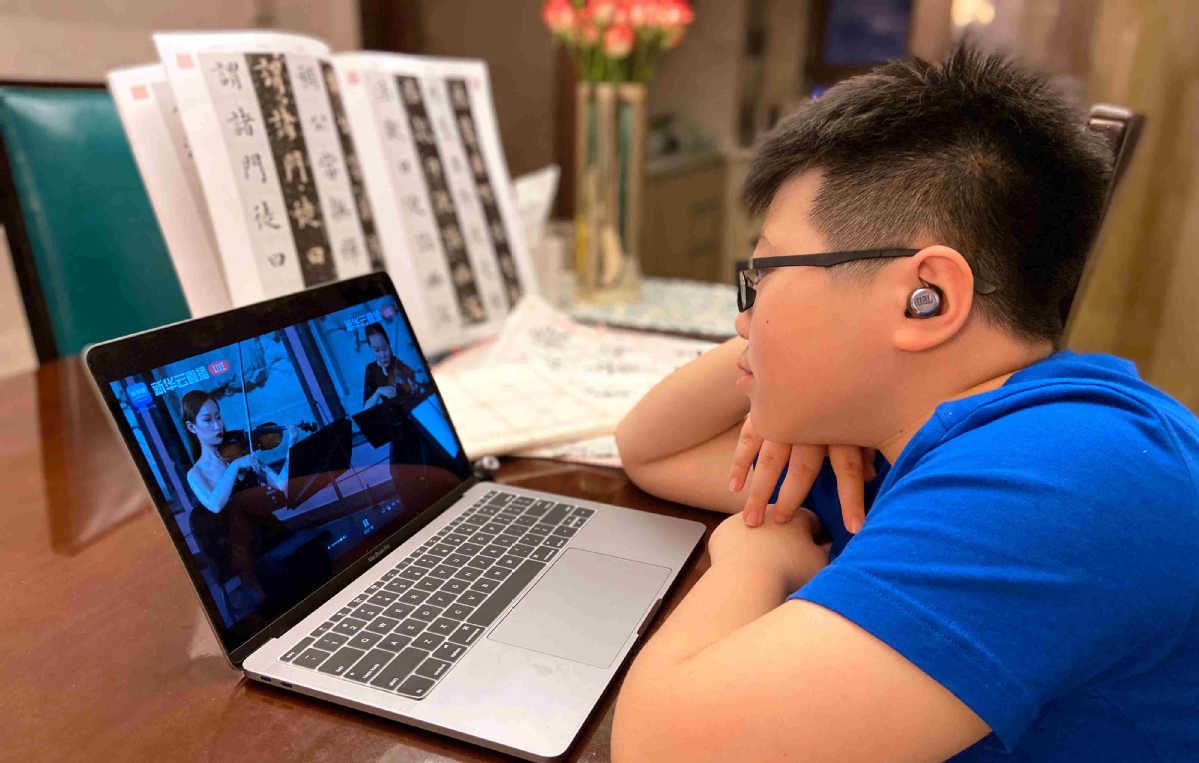Audiences, businesses quick to move online
 0 Comment(s)
0 Comment(s) Print
Print E-mail China Daily, December 25, 2020
E-mail China Daily, December 25, 2020

Infections from COVID-19 had already become a public concern in China before the start of the Spring Festival holiday on Jan 25 as many people were preparing for annual family reunions during the weeklong holiday.
While the number of employees working from home during the outbreak rose, the integration of advanced technology, culture and entertainment helped them with daily life during tough times.
For example, smartphone users can access virtual travel at museums, buy new cosmetics, watch movies and online concerts, and even bid for artworks at auctions.
With museums closed due to the pandemic, such institutions nationwide launched virtual tours, enabling visitors to watch livestream broadcasts held by experts, including curators. They can also browse high-definition photographs of cultural relics, watch a virtual exhibition and take part in online quizzes.
These visitors have seized the opportunity to learn more about Chinese museums specializing in various fields, including those institutions that are not particularly popular.
Bai Xuesong, a tourist guide from Xi'an Beilin Museum, located in the capital of Shaanxi province, became an overnight celebrity with his humorous and knowledgeable livestream broadcasts featuring Chinese calligraphy. His popularity also triggered public interest in the museum.
In mid-March, Sina Weibo's monthlong activity "Virtual travel to museums" generated more than 390 million views, with over 7,100 original posts from museums at home and overseas, media outlets and individuals.
Although museums started to reopen in mid-March, with strict limits on the daily number of visitors, they have continued to use virtual travel activities to promote themselves and to give visitors an alternative choice.
On May 18, International Museum Day, institutions in China held a range of livestream activities. Curators from nine leading museums introduced their creative cultural products during a session on the retail platform Taobao, attracting more than 7.4 million views.
In May, a report by e-commerce platform Meituan showed that the five cities attracting the most searches for their museum audio guides and livestream broadcasts were: Xi'an; Beijing; Chengdu, capital of Sichuan province; Nanjing, capital of Jiangsu province; and Suzhou, Jiangsu.
In late January, the Ministry of Culture and Tourism ordered travel agencies to suspend outbound group tours.
Overseas museums, including those that remain closed, have cooperated with Chinese platforms to livestream their collections. These institutions include the Pompidou Center in Paris and the Prado Museum in Madrid.
In July, the Chinese tourism website Mafengwo invited travel influencers and tourist guides to share their stories of museums at home and abroad via livestreaming sessions, which included in-depth introductions to specific topics.
Li Xinjian, dean of the School of Tourism Management at Beijing International Studies University, said, "Virtual travel has not only cultivated potential visitors and promoted knowledge about museums-it has made people realize the influence of digitalization.
"Advanced technology allows visitors to learn about ancient exhibits without actually being on-site, giving full play to the educative function of museums."
Li said museums are also facing challenges. They need to integrate ancient exhibits and modern technology, increase investment in digitalization, establish and improve their online services and develop more creative cultural products as souvenirs, he said.
Movie premieres
With the pandemic forcing movie theaters nationwide to close, on Jan 25, Lost in Russia, directed by and starring Xu Zheng, became the first Chinese film to skip cinema release and premiere online.
It can be watched free on Byte-Dance's streaming platforms such as Toutiao and Douyin, thanks to the company paying 630 million yuan ($96.14 million) for the film.
Other movies intended for releasing theaters followed suit before cinemas across the country started to reopen on July 20.
The pandemic spurred the development of Premium Video on Demand, or PVOD, at home and abroad. People forced to stay home can watch new movies online by making payments ranging from 6 yuan to 24 yuan.
In late August, the 10th Beijing International Film Festival held its first online broadcast, with viewers paying for e-tickets to watch movies online.
Five months earlier, a survey by the China Film Association and ticketing service Maoyan found that 73 percent of 1,530 respondents had paid to watch movies online, with 64 percent saying it was acceptable to do this.
On Sept 4, the long-awaited action film Mulan, which is set in ancient China, premiered on the streaming service Disney+ in the United States and some other countries, with an additional $29.99 charge on top of the monthly subscription fee of $6.99.
Film critic Raymond Zhou said the rise of streaming platforms had impacted cinemas even before COVID-19 emerged.
He said it is not the first time cinemas have been under threat, with the popularity of television, videos and DVDs also hitting them, especially in the US.
"Entertainment forms are changing over time. Just as the emergence of movies affected the popularity of drama theaters, the advent of new technology, such as 4D, will also impact the film industry," he said.
"It's convenient to watch movies online at home, but there is a lack of social contact," Zhou added.
He said Chinese streaming platforms have created popular reality shows and TV series, but no blockbuster movies. Such films help platforms win more hits when broadcast online.
Zhou believes that when the pandemic is brought under control globally, viewers will gradually return to cinemas because of the "irreplaceable personal experience".
He said some films are more suitable to watch at the cinema, for example, the Oscar-winning 1917, which offers an immersive experience in a movie theater.
Judging from the Chinese box office this year, he said viewers prefer to watch blockbusters made by well-known directors and which feature A-list stars, as these films appeal to both young and old audiences.
Online concerts
With offline performances canceled due to the pandemic, record companies, music and livestreaming platforms have organized online concerts and music festivals featuring leading singers and bands.
Music platforms and record companies are also using online performances as an opportunity to promote new singers and bands, and to generate fresh ideas for performances.
Most online concerts and music festivals are free, and viewers can communicate with musicians by making comments during livestreaming sessions.
In April, music streaming service provider NetEase Cloud Music launched 100 online concerts, with the money earned from them going to the singers and bands as part of a program to support musical talent. The platform later staged pay-per-view concerts featuring celebrities such as the hit band TFBoys.
On April 11 in Beijing, the National Center for the Performing Arts launched its Spring Online Concert series for audiences forced to stay home due to the pandemic.
Viewers are offered music by composers such as Beethoven, Mahler and Mozart performed by the China NCPA Orchestra. The first online performance attracted more than 30 million hits.
A report by market consultancy iMedia Research stated that in the first half year of this year, more than 80 million people were subscribing to online music performances.
The suspension of offline concerts and music festivals has triggered demand for online entertainment and spurred the development of virtual concerts.

The report said more than 64 percent of respondents said online music performances had become an important source of entertainment for them during the pandemic. Over 63 percent said that when they chose an online platform, their main consideration was the musicians who were performing.
Initially, online music platforms largely depended on their singers and bands to attract viewers, which led to fierce competition, the report said.
It added that it is important for the online music performance market to attract new users, retain regular ones and explore ways to make money, such as by staging paid-for online concerts.
Artworks auctioned
During the pandemic, major auction houses and galleries worldwide have switched to online sessions to continue their business.
In China, physical auctions started to resume in July, as the number of infections fell nationwide.
China Guardian, one of the country's biggest art auction houses, began its autumn season early this month, attracting sales of more than 2.32 billion yuan, a rise of 45 percent on its spring season. Some 40 percent of the lots were sold online, resulting in sales of over 300 million yuan.
For the autumn season at Beijing Poly International Auction, on-site and online buyers could bid at the same time. Online buyers made 2,000 bids and bought 245 lots, with sales reaching about 89 million yuan.
According to market research company ArtTactic, global onlineonly auction sales at Sotheby's, Christie's and Phillips produced sales totaling $596.7 million from January to August, a rise of 255 percent over the whole of last year.
Xie Xiaodong, founder of the art information platform Zai Art, said the rising number of online events is likely to offer new opportunities for auction houses, as buyers worldwide can make bids in cyberspace.
"Auction houses are updating bids made at physical auctions in real time and are organizing virtual auctions at the same time," Xie said.
He added that the challenge for the industry is to change perceptions and concepts. Auction houses should attach the same level of importance to online promotion as they do to offline work, he said.
For example, they should work out how to better present the appearance and details of an artwork online and ways to attract more potential bidders via livestreaming and short videos.
Xie said the development of online auctions has improved virtual services, with a greater variety of artworks being auctioned in cyberspace.
The advantages of such auctions are that they are easy to prepare and the cost of staging them is lower than for physical sales.
As auction houses rely largely on regular customers, he suggested the money they save by staging online events should be invested in customer service and content.
As an example, he said they should develop WeChat mini-programs that allow users to browse information about auction lots.
Livestreaming sales
Livestreaming sessions have become a popular way for the retail industry to promote products during the pandemic by using celebrity hosts such as Li Jiaqi and Wei Ya.
With customers attracted by low prices and discounts, some medium-sized and small enterprises are relying on these broadcasts to recover lost business.
Mayors and county magistrates, especially those from areas badly affected by the pandemic, have cooperated with major livestreaming platforms to promote local specialties, such as farm produce, to boost economies that have ground to a standstill.
A recent financial report from Alibaba showed that up to Sept 30, the gross merchandise value of its livestreaming business Taobao reached 350 billion yuan, with the platform helping consumers find new products and brands.
The report said some 70 percent of livestream broadcasts were staged by brands and online shop owners.
In February, with people confined to their homes due to the pandemic, the number of new online shop owners wanting to join Taobao rose by 719 percent month-on-month.
During the Singles Day shopping festival last month, the number of Taobao livestream broadcasts rose by 50 percent year-on-year, with 300 celebrities and 400 entrepreneurs selling products online.
Hu Hao, who supervises e-commerce business for domestic fashion brand Peacebird, said, "By livestreaming, we can present our products more directly and it allows us to communicate with our fans."






Go to Forum >>0 Comment(s)